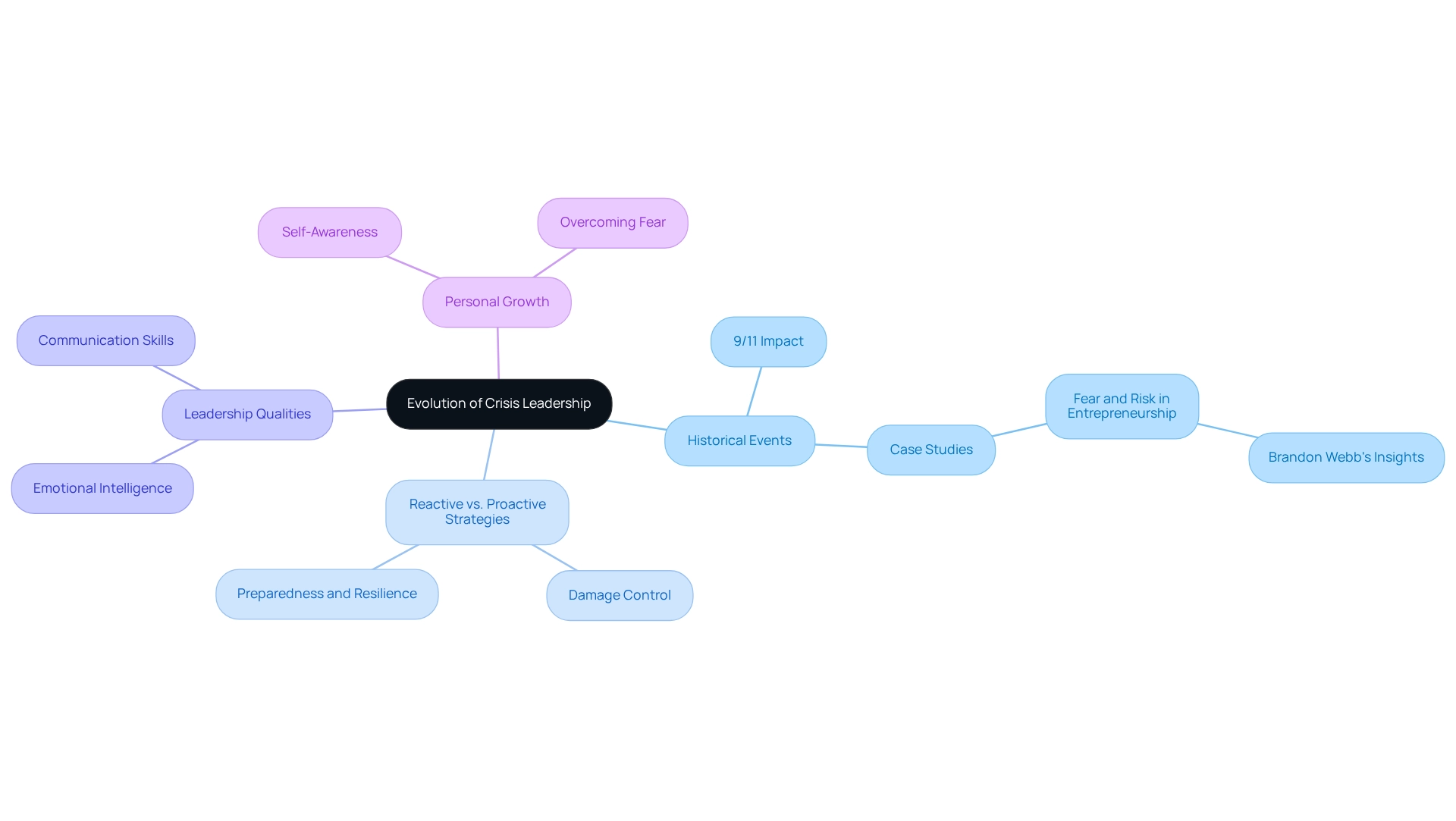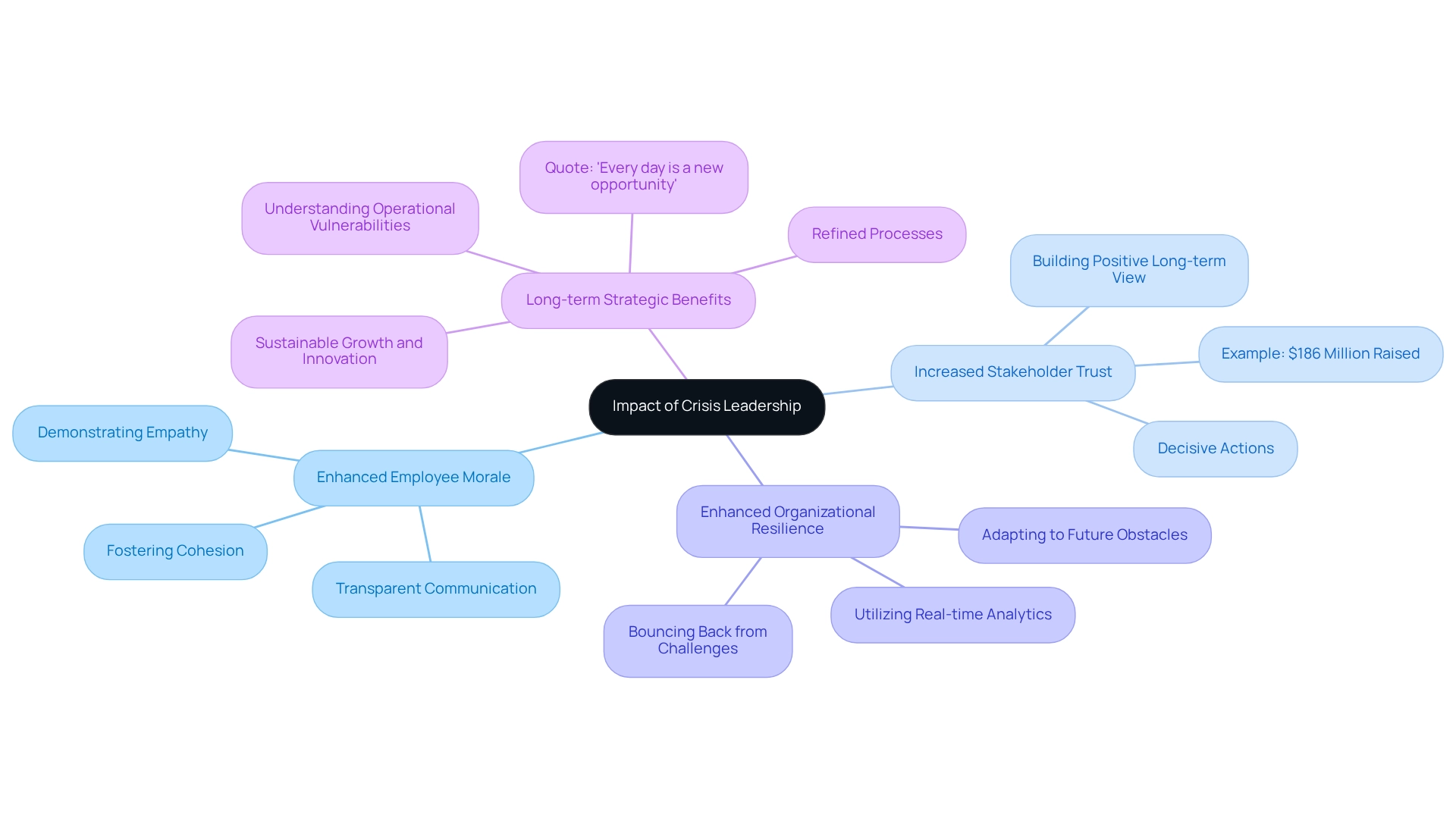Overview
Business crisis leadership demands decisiveness, clear communication, and emotional intelligence—traits that are indispensable for navigating organizations through turbulent times and ensuring enduring resilience. Effective leaders who embody these characteristics not only bolster employee morale and stakeholder trust but also cultivate adaptability and strategic growth. This ultimately positions their organizations to not just survive but thrive in the face of crises. It is imperative for leaders to recognize the significance of these qualities and actively develop them to enhance organizational effectiveness.
Introduction
In a world where uncertainty looms large, the role of crisis leadership is undeniably critical. Organizations grapple with unexpected challenges—from financial downturns to global pandemics—placing leaders in a position where immediate problem-solving is paramount, alongside the need to foster long-term resilience.
This exploration delves into the essential characteristics that define effective crisis leadership, the evolution of strategies in response to historical events, and the profound impact that adept leadership can have on organizational morale and trust.
By understanding these dynamics, businesses can better prepare for the inevitable storms ahead, transforming crises into opportunities for growth and innovation.
Define Business Crisis Leadership
Business crisis leadership involves the strategies and actions implemented by leaders or management teams during critical events that threaten an organization's stability and viability. This involves addressing unforeseen obstacles such as financial downturns, natural disasters, or public relations issues. is characterized by a proactive approach that not only addresses immediate responses but also emphasizes recovery and long-term resilience.
Important characteristics of effective managers in challenging situations include:
- Decisiveness
- Clear communication
- Emotional intelligence
These traits are vital for steering teams through uncertainty and maintaining organizational integrity. As John Hall, a Senior Contributor at Forbes, observes, "No individual in a position of authority wishes to experience a difficult situation. However, they are pretty much inevitable in today’s unpredictable, digital-driven world." This underscores the necessity for individuals in authority to be prepared.
Recent trends suggest that those who engage in emergency management training feel more equipped to tackle unforeseen challenges, highlighting the significance of continual growth in managing difficult situations. For instance, during the pandemic, a manager's execution of a flexible work plan allowed employees to work from home, alleviating fears and ensuring business continuity while maintaining productivity. This proactive approach exemplifies the critical role of effective business crisis leadership during challenging times in fostering organizational stability and achieving sustainable growth.
Moreover, utilizing real-time analytics via tools such as our client dashboard can significantly enhance a manager's capacity to react quickly and efficiently during emergencies. This dashboard provides that aid in diagnosing business health and operationalizing lessons learned for future resilience. Additionally, the commitment to developing strong, lasting relationships is vital, as it fosters trust and collaboration, essential during challenging times. Incorporating a culture of testing hypotheses enables executives to make informed decisions based on data, further enhancing their response strategies.
Explore the Evolution of Crisis Leadership
The development of emergency management has been significantly shaped by pivotal historical events that tested individuals' abilities to respond effectively. Initially, emergency management was primarily reactive, concentrating on damage control post-incident. However, this paradigm has evolved toward proactive strategies that emphasize preparedness and resilience.
For instance, the aftermath of the 9/11 attacks catalyzed the establishment of organized emergency management systems across various organizations, highlighting the necessity for leaders to anticipate potential challenges instead of merely reacting to them. A comprehensive study analyzing 2033 relevant sources revealed that managerial behavior profoundly influences employee performance and organizational discipline, emphasizing the significance of business crisis leadership in navigating challenges.
Today, influential leaders are tasked not only with managing emergencies but also with demonstrating business crisis leadership to cultivate a culture of resilience within their teams, equipping them to tackle future obstacles. This evolution underscores the increasing importance of emotional intelligence and communication skills in business crisis leadership, as leaders must inspire confidence and foster collaboration during difficult situations.
Historical case studies, such as those presented by Brandon Webb, founder and CEO of Hurricane Group, illustrate that business crisis leadership requires confronting fear and managing risk as essential components in challenging circumstances. Webb's insights stress that mastering fear enables individuals to take calculated risks, ultimately steering their organizations toward .
As Jodi Picoult wisely noted, 'Perhaps it did require a challenging situation to discover your true self; maybe you needed to be hit hard by life before you realized what you sought from it.' This statement reinforces the personal growth aspect of difficult situations, affirming that business crisis leadership can lead to enhanced self-awareness and capable leadership.

Identify Key Characteristics of Effective Crisis Leadership
is defined by several essential traits that significantly influence business outcomes. In the context of business crisis leadership, leaders must quickly assess situations and act decisively to mitigate risks, as this decisiveness can directly impact recovery efforts and overall business resilience. Streamlined decision-making processes are essential, enabling individuals in charge to respond swiftly to emerging challenges and capitalize on opportunities for improvement.
- Communication Skills: Clear and transparent communication is crucial for building trust and keeping stakeholders informed. Leaders should articulate not only the current situation but also the rationale behind their decisions. Notably, only one-third of employees feel their leaders communicate effectively, underscoring the need for improvement in this area. Additionally, 89% of employees think that trust and confidence are vital qualities for leaders, emphasizing the essential role of effective communication in building trust.
- Empathy: Acknowledging the emotional impact of a situation on employees and stakeholders is essential. Leaders who exhibit empathy foster a supportive environment that encourages collaboration and resilience, which is essential for effective business crisis leadership during challenging times. As Tom Jendriks notes, attracting and retaining top talent, particularly among millennials, requires a reevaluation of leadership strategies to align with their expectations and values.
- Adaptability: The ability to pivot and adjust strategies in response to evolving circumstances is critical. Business crisis leadership is not a universal solution; entities must stay adaptable and reactive to the distinct challenges that each crisis presents. This adaptability enables more efficient responses and improved results, as demonstrated by the necessity for ongoing monitoring and real-time analytics through tools such as our client dashboard to assess business health and modify plans accordingly.
- Vision: Successful individuals maintain a forward-looking perspective, guiding teams to concentrate on recovery and long-term objectives despite immediate challenges. This vision aids in coordinating efforts and inspiring teams during challenging periods.
Integrating these characteristics into management practices not only improves team performance but also boosts profitability, making it essential for companies to invest in developing competent leaders. Furthermore, implementing the insights gained from previous challenges is crucial for ongoing enhancement and resilience.
Assess the Impact of Crisis Leadership on Organizations
[Effective business crisis leadership](https://blog.smbdistress.com/4-strategies-for-sustainability-and-stakeholder-management) can profoundly impact companies, yielding several key advantages:
- : Leaders who communicate transparently and demonstrate empathy significantly uplift team morale, fostering a cohesive environment where employees feel valued and motivated. During challenging times, this sense of unity is vital for sustaining productivity and involvement.
- Increased Stakeholder Trust: Organizations that demonstrate decisive and transparent actions during difficult situations often experience a boost in trust from stakeholders, including customers, investors, and the broader community. This trust is essential for prompt recovery and aids in creating a positive long-term view of the entity. For example, a startup recently secured $186 million to tackle steel's dirty iron issue, demonstrating how proficient management in difficult situations can result in substantial financial support and stakeholder trust.
- Enhanced Organizational Resilience: Companies guided by skilled managers in tough circumstances are generally more capable of bouncing back from challenges and adjusting to future obstacles. This resilience offers a competitive advantage, allowing entities to navigate market fluctuations and uncertainties more effectively. The idea of emergency leadership as a transformative force is emphasized by the notion that, much like species facing extinction, entities can evolve and thrive in the aftermath of adversity. By employing strategies such as testing hypotheses and utilizing real-time analytics, individuals can continually assess their business health and make informed decisions that strengthen both internal dynamics and external relationships.
- Long-term Strategic Benefits: Successfully managing challenges allows organizations to emerge stronger, equipped with refined processes and a deeper understanding of their operational vulnerabilities. This proactive approach to emergency management encourages sustainable growth and innovation, positioning businesses for future success. As Bob Feller aptly stated, 'Every day is a new opportunity,' reminding leaders of the potential for renewal and growth in challenging times. By committing to implementing the lessons acquired during the turnaround process, entities can cultivate strong, enduring relationships that improve their overall resilience, which is essential for effective business crisis leadership, especially given the vulnerability of life and the significance of resilience as compelling reminders of the stakes involved in emergency management. By embracing these principles, organizations can not only survive crises but also emerge stronger and more capable of facing future challenges.

Conclusion
In the face of uncertainty, the importance of effective crisis leadership cannot be overstated. Organizations that prioritize decisive action, clear communication, and empathy during challenging times are better positioned to navigate crises successfully. The evolution of crisis leadership from reactive damage control to proactive preparedness highlights the necessity for leaders to cultivate resilience within their teams. By understanding the historical context of leadership responses and the traits that define successful crisis managers—such as adaptability and vision—organizations can enhance their capacity to handle future adversities.
Moreover, the impact of adept crisis leadership extends beyond immediate recovery; it fosters enhanced employee morale, increases stakeholder trust, and builds long-term organizational resilience. Companies that effectively manage crises often emerge stronger, equipped with valuable insights that pave the way for sustainable growth and innovation. The lessons learned during turbulent times serve not only as a blueprint for future challenges but also as a catalyst for transformation within the organization.
Ultimately, embracing the principles of effective crisis leadership enables organizations to turn potential setbacks into opportunities for renewal. By committing to continuous improvement and operationalizing the insights gained from past experiences, businesses can ensure they are not just surviving but thriving in an unpredictable world. As leaders step into their roles with confidence and clarity, they inspire their teams to do the same, fostering a culture poised for success regardless of the challenges that lie ahead.
Frequently Asked Questions
What is business crisis leadership?
Business crisis leadership involves the strategies and actions implemented by leaders or management teams during critical events that threaten an organization's stability and viability, such as financial downturns, natural disasters, or public relations issues.
What are the key characteristics of effective managers during a crisis?
Important characteristics include decisiveness, clear communication, and emotional intelligence, which are vital for steering teams through uncertainty and maintaining organizational integrity.
Why is preparation important for leaders in crisis situations?
Preparation is crucial because difficult situations are inevitable in today’s unpredictable, digital-driven world, and leaders need to be equipped to handle these challenges effectively.
How does emergency management training benefit managers?
Emergency management training helps managers feel more equipped to tackle unforeseen challenges, highlighting the significance of continual growth in managing difficult situations.
Can you provide an example of effective crisis leadership during the pandemic?
During the pandemic, a manager's execution of a flexible work plan allowed employees to work from home, alleviating fears and ensuring business continuity while maintaining productivity.
What role do real-time analytics play in business crisis leadership?
Utilizing real-time analytics via tools such as client dashboards enhances a manager's capacity to react quickly and efficiently during emergencies, aiding in diagnosing business health and operationalizing lessons learned for future resilience.
How important are relationships in crisis management?
Developing strong, lasting relationships is vital as it fosters trust and collaboration, which are essential during challenging times.
What approach can executives take to improve decision-making during crises?
Incorporating a culture of testing hypotheses enables executives to make informed decisions based on data, further enhancing their response strategies.




